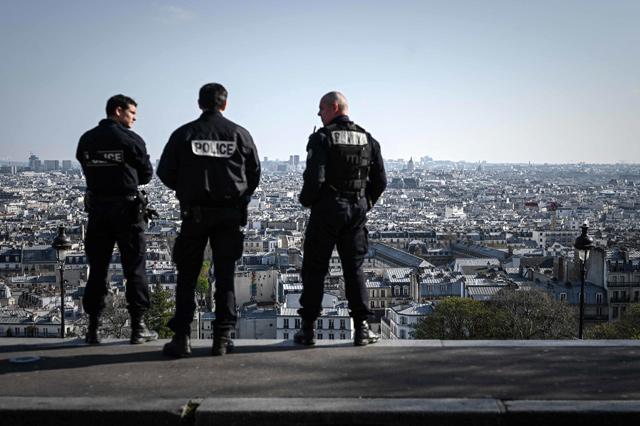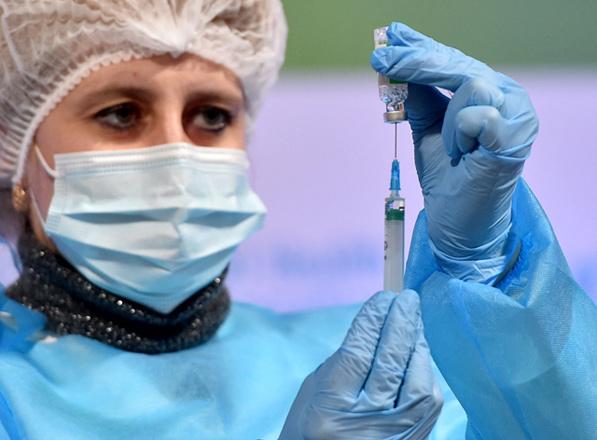You are here
Fresh lockdowns in Europe as EU threatens AstraZeneca export ban
By AFP - Mar 21,2021 - Last updated at Mar 21,2021

In this file photo taken on March 31, 2020, French police officers patrol in the touristic district of Montmartre in Paris on the 15th day of a strict lockdown in France aimed at curbing the spread of the COVID-19 infection, caused by the novel coronavirus (AFP photo)
PARIS/LONDON — France, Poland and Ukraine introduced new lockdown measures Saturday to fight a surge in coronavirus infections, as the European Union threatened to block exports of AstraZeneca jabs in an escalating row over vaccines.
In Poland most shops will be shut for the next three weeks along with hotels and cinemas, with similar measures introduced in Ukraine's capital Kiev.
A third of France's population also woke up to new restrictions, with non-essential shops shut in Paris for at least a month, although schools are staying open.
Parisians packed trains leaving the capital and crammed into shops ahead of the new partial lockdown.
The mayor of Yerres, just outside the capital, told AFP he had told businesses there to remain open, defying the "totally incomprehensible" restrictions.
"Why would we catch COVID more in a shoe store than a bookshop?" he asked.
Bookshops are considered essential under the new measures, along with florists, chocolate shops and cobblers.
The pandemic is still speeding up worldwide, with the number of new COVID-19 infections rising globally by 14 percent over the past week, according to AFP data.
In Brazil, Rio de Janeiro's famed beaches have been closed as the city's mayor warned of a "very critical" situation, with 95 per cent of intensive care units occupied at public hospitals.
President Jair Bolsonaro, who has railed against stay-at-home measures and face masks, criticised the measure.
"Vitamin D is a way to prevent the virus from seriously affecting you. And where do you get vitamin D? From the sun. Such hypocrisy," said the far-right leader.
The row over AstraZeneca’s coronavirus vaccine meanwhile shows no signs of abating, with EU chief Ursula von der Leyen threatening to halt exports of the jab if the bloc does not receive its deliveries first.
Von der Leyen said Anglo-Swedish pharma giant AstraZeneca had delivered only 30 per cent of the 90 million vaccine doses it had promised for the first quarter of the year.
The company has blamed production delays at its EU plants, but European officials are furious that AstraZeneca has been able to deliver its UK contract in full while falling short on the continent.
“We have the option of banning a planned export. That’s the message to AstraZeneca: You fulfil your contract with Europe first before you start delivering to other countries,” von der Leyen told Germany’s Funke media group.
The AstraZeneca shortfall has complicated an already stuttering vaccine rollout in Europe, but the drug maker has also had to contend with safety concerns.
Worries that the AstraZeneca jab may cause blood clots had seen more than a dozen countries pause its use recently.
Several European countries including Germany and Italy resumed AstraZeneca vaccinations Friday after following an all-clear from EU regulators and the World Health Organisation (WHO).
France also brought the jab back into use — but just hours later, the national health regulator recommended it be given only to the over-55s, given the reported blood clots were only seen in younger people.
Scandinavian nations Denmark, Norway, Sweden and Finland have all said they want more information before deploying the vaccine again.
WHO vaccine safety experts said “available data do not suggest any overall increase in clotting conditions” among vaccinated people.
Seeking to reassure their populations, British Prime Minister Boris Johnson and his French counterpart Jean Castex both received a dose of AstraZeneca on Friday.
“I literally did not feel a thing. It was very good, very quick,” said Johnson who became seriously ill from COVID-19 last year.
In Pakistan meanwhile, Prime Minister Imran Khan tested positive for COVID-19 two days after receiving China’s Sinopharm vaccine.
German Chancellor Angela Merkel and Italian Prime Minister Mario Draghi committed to get the AstraZeneca vaccine soon.
Foreign fans banned from Olympics?
With more than 400 million vaccine doses already injected globally as inoculation campaigns gain pace, organisers of the Tokyo Olympics have been hoping this summer’s pandemic-delayed Games could provide “proof of humanity’s triumph over the virus”.
But organisers meeting Saturday said they will bar overseas fans from the Games, meaning there will be little of the international party atmosphere that usually characterises the Olympics.
Signs of lockdown weariness have abounded in cities across the world, with protests against restrictions popping up in Vienna, Sofia and Montreal on Friday.
Some 20,000 people were expected at a demonstration in the German city of Kassel on Saturday, raising fears it could turn into a superspreader event.
‘Huge success’
The British government on Saturday hailed its coronavirus vaccination programme as “a huge success” after announcing half of the adult population had now received a jab.
Health Secrtary Matt Hancock said the biggest vaccine drive in the country’s history, which began in early December, was “making massive strides” following a record number of inoculations on Friday.
Prime Minister Boris Johnson was among those to get a jab that day, receiving a first dose of AstraZeneca’s vaccine at the same London hospital where he fought for his life almost a year ago after contracting COVID-19.
Britain has vaccinated nearly 27 million people, and administered on average more than 421,000 doses a day in the week to Monday, according to the latest health ministry statistics.
However, the state-run National Health Service (NHS) in England warned this week in a letter to local vaccination centres that doses will be “significantly constrained” from March 29 for four weeks.
The setback means the next phase of the inoculation campaign, covering people in their 40s, will have to be suspended until May, the letter said.
The government has insisted the change, caused by a supply shortfall from the Serum Institute of India, the world’s biggest vaccine maker, would not derail its plan to ease COVID-19 lockdowns in the coming months.
“I am absolutely delighted to tell you that we have now vaccinated half of all adults in the United Kingdom. It’s a huge success,” Hancock said in a video posted on Twitter.
“It’s so important, because this vaccine is our way out of this pandemic.”
Britain’s successful vaccination campaign contrasts with Europe, which has struggled with its own rollout and has been seeing a fresh surge in infections.
Related Articles
LONDON — Queen Elizabeth II’s oldest son and heir on Wednesday criticised opposition to coronavirus vaccines, as British ministers sought to
GENEVA — The EU's medicines regulator said onTuesday there was so far "no indication" the AstraZeneca vaccine causes blood clots, urging cou
BRUSSELS — A co-founder of the global scheme to provide vaccines for poor people said onThursday that India was delaying exports of much-ne


















